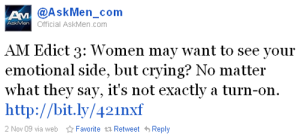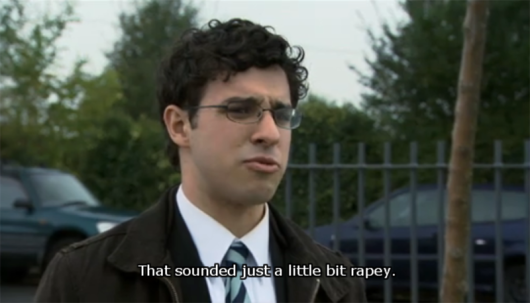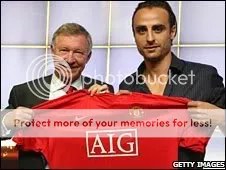Remember when we were kids and you never stepped on the cracks? You always looked down when we were walking together, to make sure. You’d talk and listen and laugh but always with your head down, your slightly shaggy brown hair falling over your eyes and making you unreadable. Remember I’d look up and around me, up at the buildings and over their tops at the sky, and if I wanted to point something out to you, a bird, a funny sign, a pretty cloud, you’d have to stop before you could look. Remember we were never in a hurry so it didn’t matter then. Your feet knew the route – the right path on the solid, unbroken paving slabs – from your house to my house, from my house to yours; it was your house then, ‘my parents’ place’ you call it now, I don’t even know who lives in mine. It might be empty.
Remember sitting on the wall across from the park and watching what we thought of as the ‘little’ kids on the swings when we decided we’d got too old. Do you ever wish it could be like that again? Or later, when we were teenagers and suddenly you were taller and our whole bodies changed, when we lay together in my new attic room and made inevitable love in the afternoon sunlight and the scent of pine.
Remember how we moved together, tentative, curious, but natural and easy as breathing; remember how, once we’d lain naked there that first time, it was as though we could never really be separate again; nothing as pedestrian as clothes could stop that feeling of our sweat intermingled on our skins. Remember later still, how jealous all your lovers were of me, how jealous all my lovers were of you; how difficult it was for them to understand that neither of us could ever really be owned. How difficult for us to understand that anyone could. Remember how our union seemed to irrepressibly laugh at their ideas even when we tried to respect them, how it had gone deeper, then, already, and couldn’t be removed; how unselfishly, how unflappably we shared one another; remember the nights when we admitted that we were single, or the nights when we just didn’t bother trying to resist whatever force it was that pulled us together again, as big as the tide; the nights after dinners or a drink or two when we’d reach into one another’s clothes and find exactly what we expected all over again.
Remember how we’d talk late into those nights, in the dark, feeling the warmth of your breath on the back of my neck, or sometimes my breath on yours; your fingertips in my hair, mine all along your spine. Remember we’d tell each other all the secrets of our various conquests and failures, little things they said or did, you’d make me laugh imitating some strange, silly girl, some poor girl who by then must have realised that you could never really love her, not because of me but because you didn’t know how. Your body became like an extension of my own, I knew every fold and every hair; I could never mind you seeing me naked, never even remember to think about it and cover myself because you’re a mirror. Your eyes are like a mirror – they take the colour of what you’re wearing that day and reflect it, turning faintly blue, faintly green, faintly brown from day to day so you always look put-together; when you’re naked they are grey. I like the way they age as your clothes do; that Batman t-shirt you’ve had forever started out black and so your eyes looked dark when you wore it, and the light in them looked brighter, everything is more lustrous against the darkness. Now it’s so faded, the print cracked and almost disappearing, it’s the same colour as your naked eyes, the real colour, so when you put it on your eyes don’t change, they’re grey, endlessly grey, deep as a whole hall of mirrors, and you look older. When you’re old maybe you’ll start to wear white and your eyes will be pale, colourless as water, and the pinpoints of light won’t show up in them to make them sparkle and you’ll just have two black dots; maybe, but don’t do it until then.
Remember when we both moved away and for the first time had to talk, really talk, to one another on the phone; how I hated the phone, how dreadfully I missed you with that horrible plastic thing pressed to my ear, how far it was from your fondly-remembered lips, your warm morning neck, the brushing touch of little bunches of your hair, still always slightly tangled, slightly overgrown. How your voice sounded different and far; even when I was happy and when you made me laugh, more often than not after those late-night conversations I’d feel suddenly cold, missing you, I’d feel empty and so alone and no-one else could quite do, though heaven knows they tried; I’d distract myself, I’d play with men, it was great fun, I’d never admit that it never felt the same. Hand in glove. Every time we’d finally manage to hang up, I always wanted to call you straight back, the click of the receiver into its cradle a sharp cruel snip to the thread that connects us, the un-bilical cord; I’d feel that cold that starts in my chest, spreads out from the inside, and I’d start to cry, quietly, not knowing why, then sleep and dream.
Remember when I visited you in the spring, the day I arrived was sunny and we sat in your garden among the patchy grass and all the beautiful weeds, the smell of smoke drifted across from your neighbours having a barbecue, we sat there talking until well after sunset. Bindweed climbing up your fence, whisky and ice in a shallow glass, you’d started smoking again by that time too. The next day when we went for a walk, remember you said you’d show me the city, that spring was so beautiful; I had those big sunglasses on and all the stones of all the buildings looked almost pinkish and warm, everything glowing because we were together. Remember that night when we were in the park and you finally told me about the twenty-five girls and the sense of emptiness you felt with them, the difficulty you’d had in trying to understand them, trying to care; remember how you looked away from me, although it was almost dark by now and everything was hazy, streetlit sodium-vapour orange, and for the first and only time I saw you cry. When we’d talked it out and kissed and smoked and kissed again, deeper this time and more urgently, when we’d dried you off, we walked back to yours in silence and this time I was the one to look down and watch your feet: this time you stepped on the cracks.




























